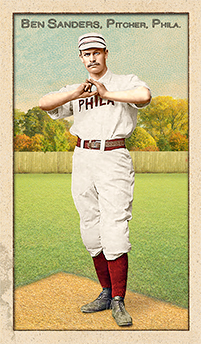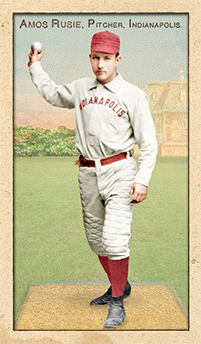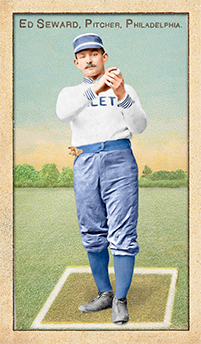
- Series: Beginnings: 1880's
- City: Philadelphia
- Team: Athletics (AA)
- League: American Association
Edward William Seward (nee Sourhardt) (1867-1947) was just 20 years old when he teamed with Gus Weyhing on the mound as the Athletics’ formidable starting duo, combining for 51 of the team’s 63 wins. “Kid” Seward had begun in the minors at 16 so was something of a veteran when Philadelphia made him their ace. Ed started and finished 110 games in ’87 and ’88, winning 60. He was on fire in 1888, leading the American Association in strikeouts and shutouts while hurling a no-hitter against the Cincinnati Red Stockings on July 25. He went 35-19 with a 2.01 ERA. The phenom began to burn out the following year but still posted a strong 21-15 season. His final year with the A’s, 1890, saw the Kid fall off to 6-12. A brief look with the Cleveland Spiders the following year was his last, starting a mere three games and winning two. His mound-mate Weyhing matched his no-hitter a week after Ed’s. Nicknamed “Rubber Arm,” Weyhing indeed proved the more durable, going on to a 14-year career. Nevertheless, for a couple of seasons, these two strong-armed youngsters really lit it up in the city of brotherly love.
- Seward’s overall record was 89-72 with a 3.40 ERA and 589 strikeouts
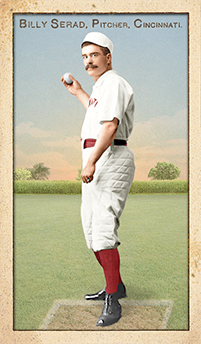
- Series: Beginnings: 1880's
- City: Cincinnati
- Team: Red Stockings (AA)
- League: American Association
William I. Serad (1863-1925) pitched for two major-league teams, the Buffalo Bisons and Cincinnati Reds, from 1884-88. His entire time in pro ball included seven teams over eight years. His performance in the minors was consistently better, earning him chances where he failed to rise above mediocrity, attested by his ML 35-55, 4.13 ERA record. Billy surrendered 34 HRs and was particularly victimized by Anson’s White Stockings who jumped on 15 of his offerings. He appears to have been plagued by nerves, in evidence during his debut when he walked 3 and scored 2 on wild pitches in the first inning. As a weak hitter, the manager had nowhere else to put him until he could settle down. Unlike better-hitting pitchers, Billy had to make it solely on his mound prowess which didn’t quite measure up.
- Billy wasn’t a total failure by any means. In his rookie year he won 16 of the Bisons’ 62 victories en route to a third-place finish
- Series: Beginnings: 1880's
- City: Philadelphia
- Team: Quakers
- League: National League
Alexander Bennett Sanders (1865-1930) pitched for the Quakers, Athletics and Colonels over a 5 year career. His odd delivery left him facing 2nd base and vulnerable to the bunt. Nevertheless, Sanders went 80-70 with a 3.24 ERA. Perhaps his fielding limitations led to his yielding 2 runs despite hurling a no-hitter against the Orioles on 8/22/92—the 1st no-no where the loser scored.
- Sanders joined the ill-fated Player’s League with Philadelphia in 1890
- As a rookie, nearly achieved a 2nd no-hitter, giving up a one-out single in the 9th
- Series: Beginnings: 1880's
- City: Indianapolis
- Team: Hoosiers (NL)
- League: National League
- Hall: National Baseball Hall of Fame
“The Hoosier Thunderbolt” (1871-1942). In a 10 year career: (8) 20-win & (4) 30-win seasons; 5x strikeout & 2x ERA leader; won pitching’s Triple Crown in 1894. Rusie threw hard for the era, once hitting HOFer Hughie Jennings in the head, inducing a 4-day coma. This event was influential in increasing the pitching distance to 60’6″ from its original 50 feet.
- Once was traded for Christy Mathewson
- Suffered hearing loss due to line drive to the head
- Elected to Hall of Fame: 1977
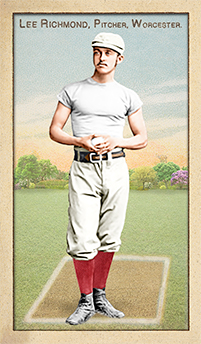
- Series: Beginnings: 1880's
- City: Worcester
- Team: Worcesters
- League: National League
J. Lee Richmond (1857-1929). One of the most noteworthy scholar-athletes of the 19th century, Richmond set many firsts in MLB: 1st regular left-handed pitcher, 1st to record five consecutive strikeouts, 1st minor-leaguer to single-handedly gain his team major-league status, 1st lefty to win 30 games, 1st M.D. to play in the majors, and, oh yes, 1st pitcher to hurl a perfect game. The latter accomplishment was noted at the time more for the unlikeliness of nine bare-handed fielders achieving “perfection” and Richmond always credited his team’s support as the key to his career highlight. Richmond also accomplished one last: his dominance for Brown University’s squad – while he was being lured in and out of the majors by Harry Wright and Frank Bancroft – so upset the Ivy League that they legislated against any “professionalism” in the college ranks, laying the foundation of NCAA policy to this day.
- Threw two no-hitters in 1879 (one was a 7 inning exhibition game). His perfecto came on June 12, 1880, giving Lee 3 no-hitters in 54 weeks!
- As with many early pitchers, Lee’s arm suffered from overwork, leading to his early departure for private medical practice back in Ohio
- Found his true calling as a teacher of Greek, physics, chemistry and math while coaching baseball, conducting the orchestra and serving as principal. A polymath indeed
- Lee Richmond did not appear in the Old Judge series as he had retired in 1886. This image is taken from a studio cabinet of unknown origin.
Here's an original scorecard from Lee Richmond's perfect game, the first in MLB history, June 12, 1880:
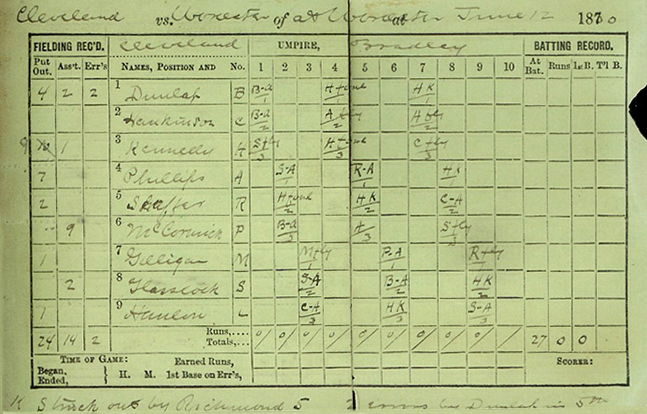
A few notes from the game:
- Only 6 months into the new decade, notice how the scorekeeper amended the date on a scorecard that was left over from the 1870s
- Richmond's opponent, the 1880 Cleveland Blues, were a good team. They finished 3rd in the National League with a 47-37 record & featured young standout talent such as Fred Dunlap, Jim McCormick, Jack Glasscock, Orator Shafer & Ned Hanlon. Richmond threw his gem against excellent competition.
- The Worcester Worcestors won the game 1-0, with Arthur "Foxy" Irwin scoring the game's only run in the 5th inning. The losing pitcher for the Blues, Jim McCormick, tossed a 3-hitter.
- The Worcestors weren't quite as stacked as the Blues (finished 5th with a 40-43 record), but featured some excellent players: Charlie Bennett, Dandy Wood, Art Whitney, Arthur Irwin, Harry Stovey & Bill McGunnigle.
- 12 of the 18 players who participated in the game have Ars Longa Art Cards: Dandy Wood, Lee Richmond, Arthur Irwin, Charlie Bennett, Art Whitney, Fred Dunlap, Frank Hankinson, Orator Shafer, Jim McCormick, Barney Gilligan, Jack Glasscock & Ned Hanlon.


